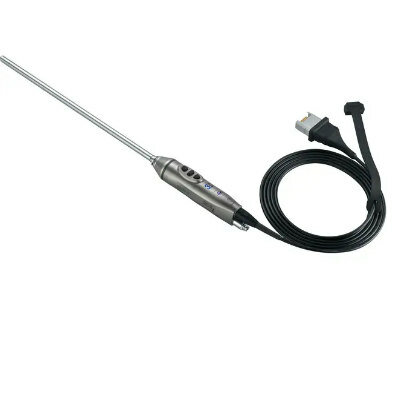Point-Of-Care Paper-Based Test Could Diagnose Cancer at Bedside
|
By HospiMedica International staff writers Posted on 18 Oct 2024 |

When cancer metastasizes from its primary location, such as the lungs or breast, to the brain or spine, there are established treatment methods available. However, when these metastases reach the cerebrospinal fluid (CSF), resulting in a condition known as leptomeningeal disease (LMD), the median survival rate drops to approximately four months with treatment. If left untreated, median survival is only a matter of weeks. Alongside its low survivability, LMD is also challenging to detect promptly using current testing methods. Presently, it can take several weeks for doctors to confirm whether the cancer has spread to the CSF, followed by additional weeks to ascertain if a treatment has been effective. Given the urgency for patients facing one of cancer's most severe complications, researchers are now striving to develop a new test that can identify the spread of cancer to the central nervous system on the same day as the patient’s visit.
A two-year study being conducted by researchers at UCLA Health (Los Angeles, CA, USA) aims to create a new test that would facilitate same-day detection of LMD and allow doctors to monitor the effectiveness of treatments like chemotherapy in real-time. The research team is working on a diagnostic kit that combines sample processing with a specialized paper-assay test, akin to those utilized in at-home COVID and pregnancy tests. Their objective is to enable doctors to draw CSF from the patient and, after processing, apply it to the paper test at the care site. Ideally, the test would not only confirm the presence of cancer cells in the CSF that same day but also provide doctors with a measure of the concentration of those cancer cells.
Current testing methods require that CSF be sent to a lab for processing, which can take one to two weeks for results. Moreover, the initial test typically has a detection rate of only 50%, necessitating additional tests to improve accuracy. Another limitation of these tests is their inability to accurately measure disease burden, which restricts their usefulness in evaluating treatment efficacy. The new test would enable real-time monitoring of circulating tumor cells, allowing doctors to quickly assess whether the treatment is effective. This would enable physicians to continue or adjust the treatment plan based on changes in cancer cell concentration. Obtaining this information promptly is vital given the poor survival rates associated with LMD. Additionally, the test could reduce costs associated with testing for LMD since it is paper-based and does not require laboratory processing. The study, which involves developing two types of diagnostics and testing with purchased cancer cells as well as some patient samples, is currently underway, with initial results anticipated in 2026.
“If the technologies work with cancer cells, then we'll start testing with cerebrospinal fluid samples from patients,” said Dr. Won Kim, Neurosurgical Director of the Brain Metastasis Program and co-investigator of the study. “If we're able to validate this in our human patients for the initial testing phase, we would like to move towards a multicenter clinical trial."
Latest Point of Care News
Channels
Critical Care
view channel
Mass Manufactured Nanoparticles to Deliver Cancer Drugs Directly to Tumors
Polymer-coated nanoparticles loaded with therapeutic drugs hold significant potential for treating cancers, including ovarian cancer. These particles can be precisely directed to tumors, delivering their... Read more
World’s Smallest Pacemaker Fits Inside Syringe Tip
After heart surgery, many patients require temporary pacemakers either to regulate the heart rate while waiting for a permanent pacemaker or to support normal heart rhythm during recovery.... Read more
AI-Powered, Internet-Connected Medical Devices to Revolutionize Healthcare, Finds Study
A new study suggests that artificial intelligence (AI)-powered, internet-connected medical devices have the potential to transform healthcare by enabling earlier detection of diseases, real-time patient... Read moreSurgical Techniques
view channel
New Transcatheter Valve Found Safe and Effective for Treating Aortic Regurgitation
Aortic regurgitation is a condition in which the aortic valve does not close properly, allowing blood to flow backward into the left ventricle. This results in decreased blood flow from the heart to the... Read more
Minimally Invasive Valve Repair Reduces Hospitalizations in Severe Tricuspid Regurgitation Patients
The tricuspid valve is one of the four heart valves, responsible for regulating blood flow from the right atrium (the heart's upper-right chamber) to the right ventricle (the lower-right chamber).... Read morePatient Care
view channel
Portable Biosensor Platform to Reduce Hospital-Acquired Infections
Approximately 4 million patients in the European Union acquire healthcare-associated infections (HAIs) or nosocomial infections each year, with around 37,000 deaths directly resulting from these infections,... Read moreFirst-Of-Its-Kind Portable Germicidal Light Technology Disinfects High-Touch Clinical Surfaces in Seconds
Reducing healthcare-acquired infections (HAIs) remains a pressing issue within global healthcare systems. In the United States alone, 1.7 million patients contract HAIs annually, leading to approximately... Read more
Surgical Capacity Optimization Solution Helps Hospitals Boost OR Utilization
An innovative solution has the capability to transform surgical capacity utilization by targeting the root cause of surgical block time inefficiencies. Fujitsu Limited’s (Tokyo, Japan) Surgical Capacity... Read more
Game-Changing Innovation in Surgical Instrument Sterilization Significantly Improves OR Throughput
A groundbreaking innovation enables hospitals to significantly improve instrument processing time and throughput in operating rooms (ORs) and sterile processing departments. Turbett Surgical, Inc.... Read moreHealth IT
view channel
Printable Molecule-Selective Nanoparticles Enable Mass Production of Wearable Biosensors
The future of medicine is likely to focus on the personalization of healthcare—understanding exactly what an individual requires and delivering the appropriate combination of nutrients, metabolites, and... Read more
Smartwatches Could Detect Congestive Heart Failure
Diagnosing congestive heart failure (CHF) typically requires expensive and time-consuming imaging techniques like echocardiography, also known as cardiac ultrasound. Previously, detecting CHF by analyzing... Read morePoint of Care
view channel
Handheld, Sound-Based Diagnostic System Delivers Bedside Blood Test Results in An Hour
Patients who go to a doctor for a blood test often have to contend with a needle and syringe, followed by a long wait—sometimes hours or even days—for lab results. Scientists have been working hard to... Read moreBusiness
view channel
Expanded Collaboration to Transform OR Technology Through AI and Automation
The expansion of an existing collaboration between three leading companies aims to develop artificial intelligence (AI)-driven solutions for smart operating rooms with sophisticated monitoring and automation.... Read more



















